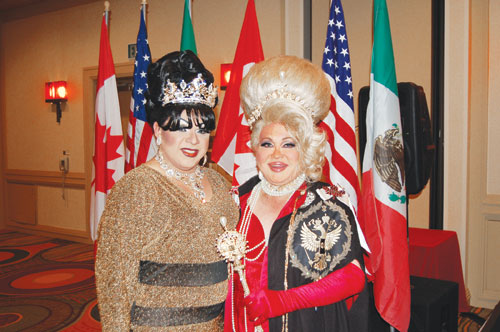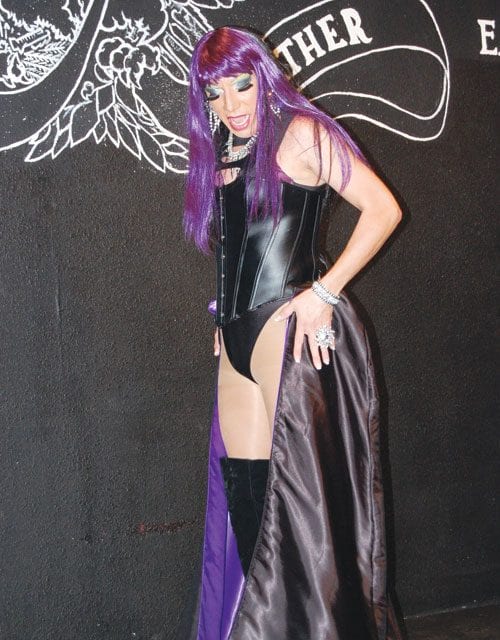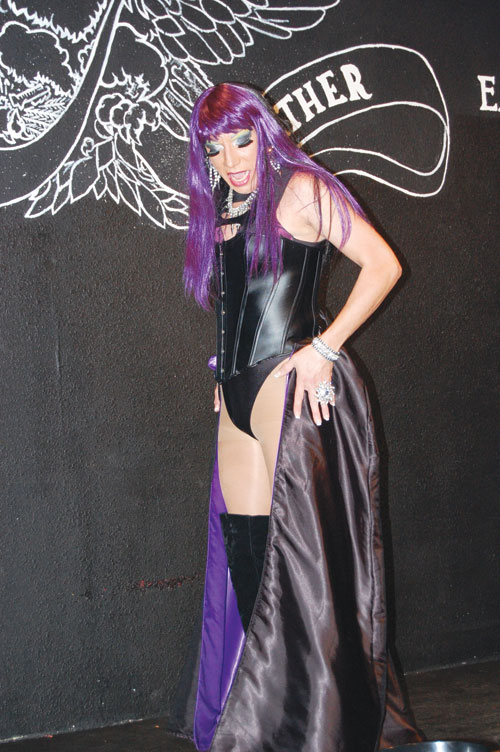Drag group is one of the oldest LGBT groups in country—and one of its biggest donors
Donna Dumae — aka Don Jenkins — calls herself “the oldest drag queen in captivity.” It seems, perhaps, a fitting description for someone who has been involved for most of her drag life with the United Court of the Lone Star Empire, the all-volunteer fundraising group that celebrates its 40th anniversary this weekend, Oct. 24-26, with events at the Crowne Plaza Hotel.
The weekend’s theatrical events, all fundraisers for the Dallas LGBT community, will also feature Nicole Murray Ramirez of San Diego, her Imperial Majesty Empress Nicole the Great, Queen Mother I of the Americas.
This is the Queen Mother’s first statewide visit to Texas, and she is here as part of the international court’s 50th anniversary celebration.
The UCLSE is part of the International Court System, one of the oldest LGBT fundraising organizations in existence. It comprises nearly 70 courts across Canada, Mexico and the United States.
Each court is a self-sustaining, not-for-profit organization. Fundraising events are typically held at gay and lesbian bars. In the coronation events, typically held once a year, one reign of emperors and empresses pass their crowns onto the next reign, elected by court members. The College of Monarchs comprises former royalty including Dumae and Devon DeVasquez.
DeVasquez, president of the UCLSE board and a former empress, said the court has raised around $500,000 since the 1990s, the first years for which financial records are first available. Beneficiaries of the court’s various charitable endeavors have included Resource Center, AIDS Services of Dallas, AIDS Interfaith Network and others.
This year, Dumae said, UCLSE has raised $70,000 for local organizations.
The International Court’s policy that local courts fundraise only for local nonprofits is one of the elements that sets the court system apart from other fundraising groups.
“We raise money here and it stays here,” said Dumae. “We’re not sending money to organizations like the Human Rights Campaign [the national LGBT advocacy organization], whose work may not directly impact local communities.”
As times have changed, active participants like Dumae and DeVasquez have stuck with the group’s traditions.
The language, local emphasis and colorful presentations are points of pride for court members, as much as they are somber reminders of past LGBT struggles.
The court’s founding is rooted in the struggle for LGBT acceptance. San Francisco gay bar owners in 1965 hosted regular public drag balls. José Julio Sarria was among those who attended.
Sarria, a World War II veteran and openly gay candidate for public office, attended so often that he won the title Queen of the Ball. But presiding over the ball was not enough for Sarria; he eventually declared himself an empress.
Sarria adopted the name “Her Royal Majesty, Empress of San Francisco, José I, The Widow Norton,” a moniker inspired by Joshua Norton who, according to the Encyclopedia of San Francisco, was an eccentric San Francisco resident in the 19th century who declared himself “Emperor of the United States and Protector of Mexico.”
Sarria eventually created the elaborate court system that grew into the current network of nearly 70 courts.
Dumae said she is proud that the UCLSE was at the forefront of the effort to raise funds to support individuals living with AIDS during the early days of the epidemic.
When “our lesbian sisters began suffering from breast cancer, we began fundraising for breast cancer research,” Dumae continued. “We owed them because they were so helpful toward us [during the AIDS epidemic].”
Ramirez — a former president of the LGBT advocacy organization Equality California and a San Diego human relations commissioner — credited the court system for spurring his LGBT activism.
Ramirez said the ICS has never gotten the credit it deserves, adding, “We’re not public relations-savvy, and we’re not looking for headlines. But we have hearts of gold.”
Some court members said the court system is misunderstood. Dumae said, “There are two types of ignorance about the court. There are those who don’t get us but don’t ask, and those who don’t want to get us.”
Don Maison is president of AIDS Services of Dallas, which has long been a beneficiary of court fundraisers. He said he isn’t aware of any stigma.
“I really don’t know what the issue is,” Maison said. “They do good work in the community and that’s what is important.”
Resource Center’s Rafael McDonnell agreed. “Some people may not know its rich history of philanthropy. They’re one of the most generous organizations in the country,” he said.
“It’s not ignorance as much as misperception.”
For members, the court is a lifestyle and a mission. And they pour considerable resources — from their own pockets — into creating their look and their events.
DeVasquez, who has been part of the court system for nearly nine years, said many in the LGBT community think court members use funds from events to pay for their elaborate costumes and crowns. But that’s not true.
“We pay for our crowns and costumes,” he said.
In fact, aside from paying for a mailbox, DeVasquez said the group has barely any overhead. It is members’ way of contributing to the community they live in.
Everyone takes action in some way, Ramirez said. “We just do it in drag.”
……………………..
United Court of the Lone Star Empire’s 40th Coronation

FIT FOR A QUEEN | Her Imperial Majesty Empress Nicole the Great, Queen Mother I of the Americas, left, is in Dallas for UCLSE’s 40th Coronation this weekend. (Photos courtesy Devon DeVasquez)
“A Quincenera at South Fork”
Oct. 24-26
Crowne Plaza, Dallas Market Center, 7050 N Stemmons Frwy.
Out of Town Show, Friday, Oct. 24; $25
Coronation Ball, Saturday, Oct. 25; $45
Victory Brunch, Sunday, Oct. 26; $25
Tickets will be sold in the hospitality suite before and during the ball.
This article appeared in the Dallas Voice print edition October 24, 2014.


